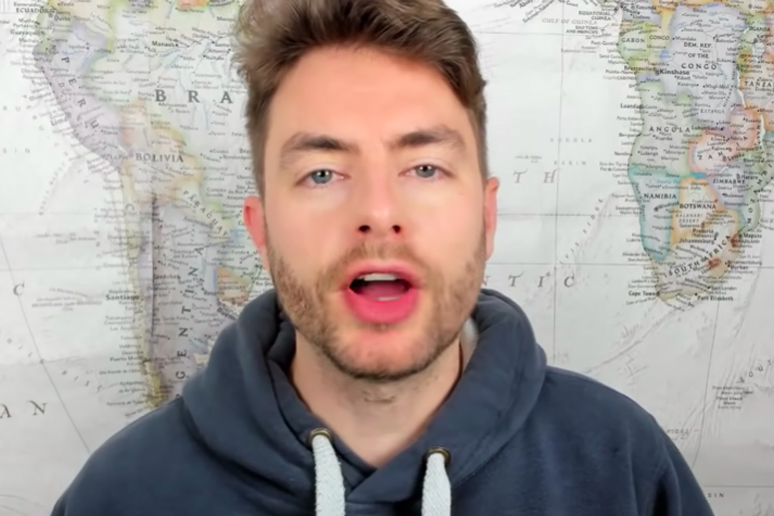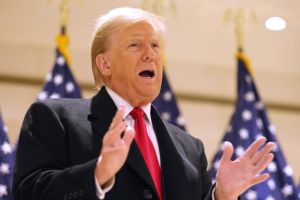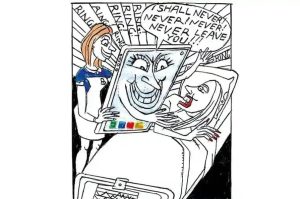Controversial social media star Donald J. Trump has jumped to the defense of controversial social media stars Alex Jones and Paul Joseph Watson after controversial social media company Facebook banned them from Facebook, Instagram and other key institutions of the political-media complex.
‘So surprised to see Conservative thinkers like James Woods banned from Twitter, and Paul Watson banned from Facebook!’ Trump tweeted on Friday night.
This is fake news. Twitter haven’t banned Woods. The digital nannies have only put him on the naughty step for appearing to suggest that Robert Mueller and his fellow reporters should be hanged. Woods and Watson are only ‘Conservative thinkers’ in the ‘Easter worshippers’ sense. Easter worshippers don’t worship Easter, and this kind of Conservative thinker isn’t a thinking conservative.
Watson isn’t the Edmund Burke or Russell Kirk of the Millennials. He’s a post-truthy digital libertarian. He’s no different from the Silicon Valley types who have expelled him from their sites. Their business model is sensationalist, and people like Watson supply the stimulus of sensation. The money is in the clicks, and the clickers trend towards the lurid and arousing — the false and the fake.
‘This is the United States of America,’ Trump tweeted on Friday night, confirming his profound grasp of global affairs, ‘and we have what’s known as FREEDOM OF SPEECH!
‘It’s absolutely vital that everyone sign up to my newsletter right now,’ Watson responded in a show of profound concern for American democracy.
Watson isn’t an American citizen. Louis Farrakhan, who was also banned from Facebook this week, is an American citizen. Farrakhan doesn’t seem to like being an American, even though he has availed himself of the timeless and distinctively American right to attach himself to a crackpot religious cult and disseminate nasty propaganda against his enemies.
As the president of all Americans, Trump should be concerned about Facebook’s selective censorship of Farrakhan. But he isn’t. Trump is concerned about the kind of ‘Conservative thinkers’ who keep the temperature high on the paranoid fringe, and whose heat feeds into the Republican base. They were Trump’s first supporters. Some of them already believed in the Birther legend whose diffusion was Trump’s first political statement. Others believe in the trash emitted by Alex Jones and Paul Joseph Watson, who used to work for Infowars: conspiracies about 9/11 and chemtrails, false allegations about Islamists, paranoid mob-baiting about a creeping takeover of the institutions of the United States by ‘radical Islam’.
Trump isn’t one of these people, but he’s in symbiosis with them, and with people like Jones and Watson. Trump is a pre-digital roué in private and a pre-digital libertarian in business, but he has an intuitive feel for the digitization of the passions. He probably doesn’t care whether a retweet is an endorsement: it’s the signal that counts — the virtue signaling of the right.
By appearing to indulge the extreme right, Trump baits the extreme left. The extreme left then yanks the chain of even moderate Democrats. That makes Trump, for all his flaws, look like the last centrist, the last defender of American liberties for independents and moderates.
This might even be true. Like the conspiracy theorists and Tea Partiers, Trump is firmly in touch with his inner Deplorable. He may be a mainstream plutocrat, but most of his retweets are identical to those of any other septuagenarian white male from Queens with a dial-up modem and a cellphone from BestBuy that has a panic button in case he slips getting out of the bath.
And it’s not as if Trump is making it up. You don’t have to be paranoid to see that a political-media complex exists in the United States. The Obama administration employed a failed novelist, Ben Rhodes, to spin the Iran Deal in what Rhodes called an ‘echo chamber’ of receptive outlets. Most of the media approached the ‘Russia collusion’ story as publicists for the Democrats. They’re still spinning the collapse of what Trump calls the ‘collusion delusion’ in favor of their preferred party.
Social media overflows with hatred and incitement but, apart from Farrakhan, only hard-right disseminators of ‘hate’ get banned. When you look at the conspiracy theories that Trump retweets, you have to wonder: if he wasn’t protected by the office of the presidency in this as in other matters, would he too have been banned this week?
Trump’s response to the Facebook bans included retweeting from an account called Deep State Exposed: ‘The “elite” proclaim America must submit to Islam or else.’ Deep State Exposed goes under the pseudonym of Jeremy Stone, and is the author of a novel called Deep State and a putative work of non-fiction, Deep State Exposed. He uses the QAnon slogan ‘wwg1wga’: ‘Where we go one, we go all’.
The tweet originates further down the pipeline of alt-right conspiracy theory, from an anonymous pro-Trump and virulently anti-Muslim account called ALX. It includes a clip from a chat show in one of the less enlightened studios of the Middle East. A Shia cleric, speaking in Arabic, is translated as saying:
‘When we conquer America, and we win over the Tyrant, we will tell the American people… pay the Jizyat!…If they refuse to become Muslims, we kill them, and take their women, and smash their churches! Let the whole world listen, this is Islam.’
The question here isn’t whether some Muslims believe this and want it to come true. It’s whether the president of the United States should be publicizing it, and whether doing so serves the national interest. The only serious answers to those questions are negative. Given Trump’s office, retweeting this kind of material from these kinds of sources is tantamount to incitement.
This kind of reactive nastiness is the hamartia, the tragic flaw, in Trump’s character. The tragic hero, Victor Davis Hanson writes in The Case for Trump, puts an ‘intrinsic and usually uncivilized trait’ at the service of his community, but it is ‘usually expressed fully only at the expense of the hero’s own fortune’. The ‘problem for civilization’ is that the hero’s unique skill often carries ‘past baggage of lawlessness and intolerable comfortability with violence’.
Trump exacerbates that problem. It will be with us long after he has left the White House. It will be with us regardless of whether Twitter ban him, which Twitter, having made click-money from him, probably will do on the day he leaves office. And we will be less and less able to discuss it and other difficult subjects on social media. For if Trump leads the struggle to protect free speech in the age of digital oligarchy and an enfeebled media, who would march with him?
Dominic Green is Life & Arts Editor of Spectator USA.


















